Are we looking at the end of the software developers as we know it with ChatGPT?

The software development landscape is poised for transformative change in a rapidly evolving world driven by technological advancements. Imagine a world where the creation of sophisticated applications is no longer confined to those with extensive coding expertise and specialized education. This vision is becoming increasingly plausible thanks to the emergence of cutting-edge AI models like ChatGPT. This article will explore this intriguing topic, seeking to understand the impact of ChatGPT on the software development industry.
As the boundaries of AI technology are pushed further, the question arises: are we witnessing the potential end of software developers as we know them? By examining the intricate interplay between humans and AI, we aim to shed light on the future trajectory of software development. We will delve into the current state of software development, the rise of ChatGPT, and the potential consequences for software developers. We will delve into the possibilities of collaboration between AI models and human developers, analyzing whether this could be the key to their continued relevance in an AI-driven landscape. Will software engineers evolve and adapt alongside AI models, leveraging their capabilities to enhance their work? Or will automation wield such power that it fundamentally alters the role of software developers? We will investigate the transformative power of ChatGPT and its implications for software developers. Moreover, we will venture into the future of software development and paint a picture of how it might evolve in a world where AI models become increasingly prevalent.
The Current State of Software Development
A high demand marks the current state of software development for skilled professionals possessing technical expertise, problem-solving abilities, and a passion for innovation. Programming languages, frameworks, and libraries are essential tools for developers to create impactful applications. Relevant industry statistics and reports support the industry’s growth and demand for software developers. By staying informed about emerging technologies and honing their skills, software developers can position themselves for rewarding careers in this thriving industry.
The Skills and Education Required
Becoming a successful software developer demands a solid foundation in computer science or related disciplines. This education equips individuals with the necessary theoretical knowledge and analytical thinking abilities to excel in the field.
Computerscience.org offers comprehensive insights into aspiring software developers’ skills and educational pathways. Proficiency in popular programming languages such as:
- HTML/CSS: HTML is a markup language, and CSS is the style sheet language used to present the information written in HTML. Together, HTML and CSS create the look of web pages. HTML defines the structure, colors, and other visual elements, while CSS arranges their aesthetics visually.
- JavaScript: JavaScript is a high-level programming language conforming to the ECMAScript specification. Alongside HTML and CSS, it ranks among the three core technologies of the internet.
- Java: As a general-purpose programming language, Java features class-based, concurrent, object-oriented functions. Designed to minimize implementation dependencies, Java allows application developers to “write once, run anywhere.” Java is one of the most popular programming languages, especially for client-server software applications.
- C#: This general-purpose programming language comprises functional, declarative, object-oriented, component-oriented, and generic programming disciplines. Developed by Microsoft within the .NET initiative, C# received approval as a standard by ISO and ECMA.
- Python: Python is an interpreted, general-purpose, high-level programming language. Python’s design philosophy emphasizes readability by using significant whitespace and providing clear programming on large and small scales.
Additionally, problem-solving skills, including logical thinking and attention to detail, are crucial for analyzing complex challenges and devising innovative solutions. While there are various pathways to a software development career, employers often prefer a solid educational foundation in computer science or related disciplines. Pursuing a degree in these fields provides a comprehensive understanding of fundamental concepts and principles, with additional opportunities for practical experience through internships, coding boot camps, or certifications.
The Demand for Software Developers:
In recent years, the demand for skilled software developers has skyrocketed due to the increasing reliance on technology across industries. Organizations spanning healthcare, finance, e-commerce, and beyond require talented developers to meet their digital requirements. The proliferation of emerging technologies like artificial intelligence, cloud computing, and the Internet of Things (IoT) has further fueled this demand. As a result, specialized developers with expertise in these areas are sought after to harness the power of these cutting-edge technologies and drive innovation forward. Industry reports, along with data from the Bureau of Labor Statistics(BLS), consistently highlight the rapid growth of employment opportunities in software development, outpacing the average for all occupations.
For example, the BLS and computerscience.org report that employment of software developers is projected to grow by 22% and 25% respectively, from 2020 to 2030, a much faster rate than the average for all occupations. This data highlights the robust demand for software developers and the promising career prospects in the industry.
 Source: computerscience.org
Source: computerscience.org
The Emergence of Advanced AI Models
The emergence of advanced AI models has sparked a technological revolution with far-reaching implications across various industries. These powerful models, driven by deep learning and natural language processing breakthroughs, have demonstrated unprecedented capabilities in understanding, generating, and processing human language. As a result, they have opened up new avenues for innovation, automation, and problem-solving, reshaping the landscape of technology and transforming numerous sectors.
AI models like ChatGPT, developed by OpenAI, are at the forefront of this AI revolution. These models employ state-of-the-art techniques to simulate human-like conversation and generate coherent responses. They are trained on vast amounts of diverse data, enabling them to acquire a remarkable understanding of human language patterns, context, and nuances. This understanding, coupled with their ability to generate human-like text, has revolutionized how we interact with AI systems and paved the way for their application in various domains.
Capabilities of Advanced AI Models like ChatGPT
The impact of advanced AI models in software development is profound, particularly in their ability to automate complex tasks and streamline processes that were once time-consuming and resource-intensive. Let’s explore specific areas where AI models like ChatGPT have significantly impacted. Some of the capabilities of ChatGPT include:
- Code Generation: AI models can generate code snippets based on specified requirements, reducing the time and effort required for manual coding. ChatGPT can generate code snippets for various tasks such as data manipulation, algorithm implementation, web development, machine learning, and much more. Suppose you have a requirement to generate a code snippet that calculates the factorial of a given number. Instead of manually writing the code, an AI model can generate the code snippet based on the specified requirement.
Here is an example:
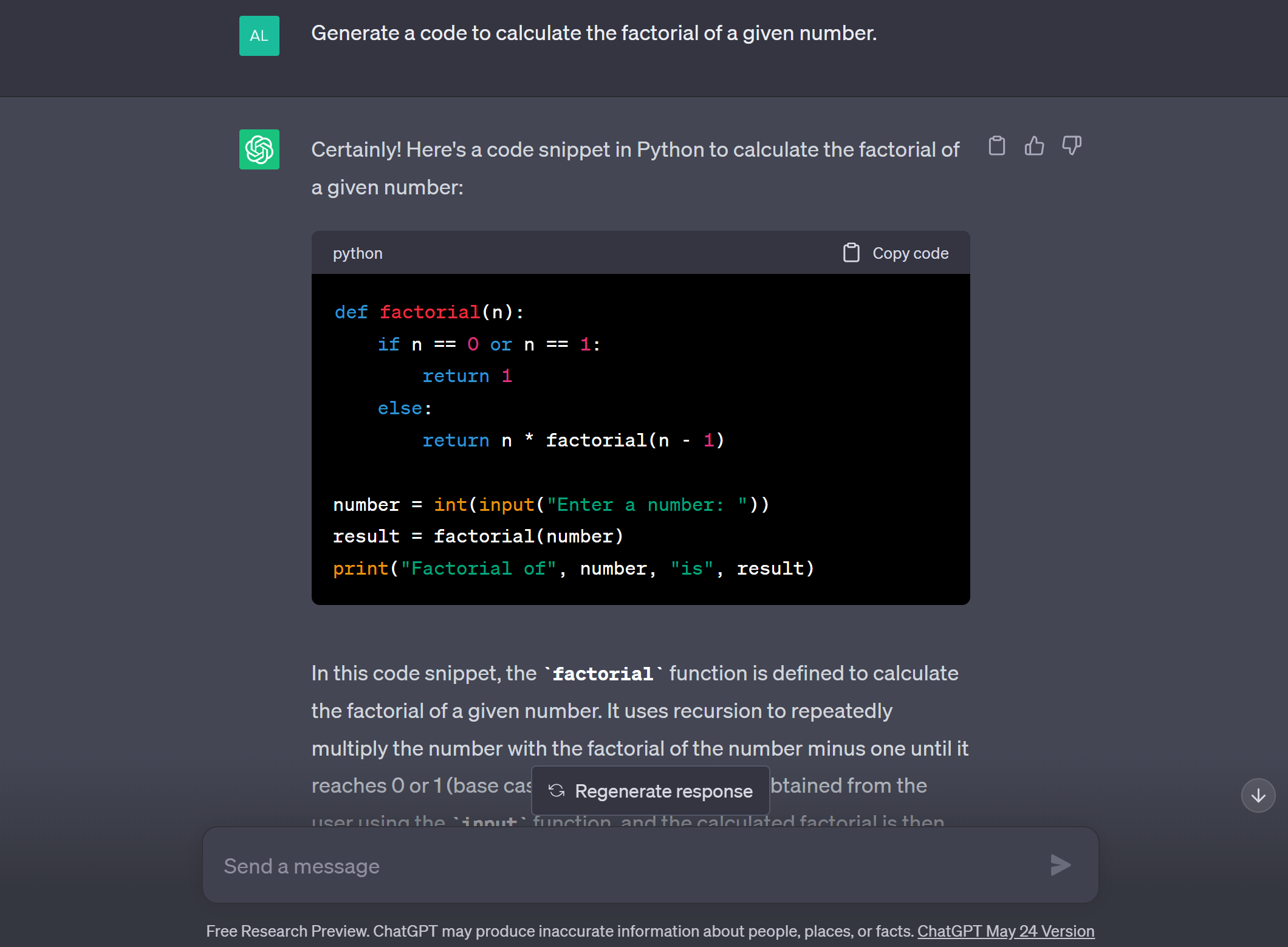 Source: Chat.openai.com
Source: Chat.openai.com
By specifying the requirements or describing the desired functionality, developers can leverage ChatGPT to automatically generate code snippets, reducing the need for manual coding from scratch. This automation empowers developers to save time and effort, allowing them to focus on higher-level tasks such as designing complex systems and optimizing algorithms, thereby enhancing productivity and unlocking new possibilities in software development.
- Programming Logic and Suggestions: AI models can offer insights and suggestions to developers, aiding in areas such as programming logic, best practices, and code optimization. These models have extensive knowledge bases that allow them to provide informed recommendations, enhancing code quality and efficiency.
For example:
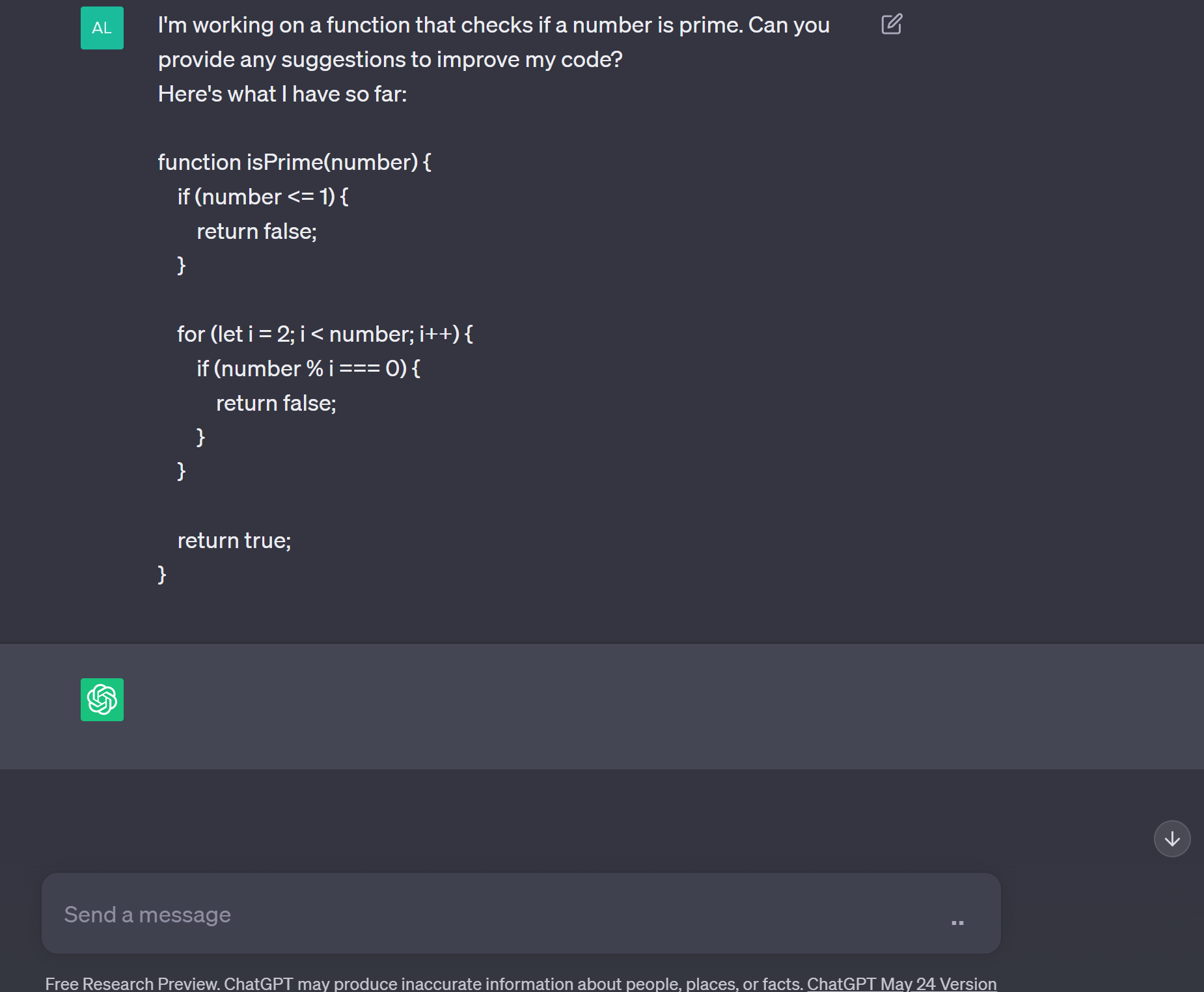 Source: Chat.openai.com
Source: Chat.openai.com
ChatGPT recognized an opportunity to optimize the code, as seen below, even further suggesting handling the special case of the number 2 separately.
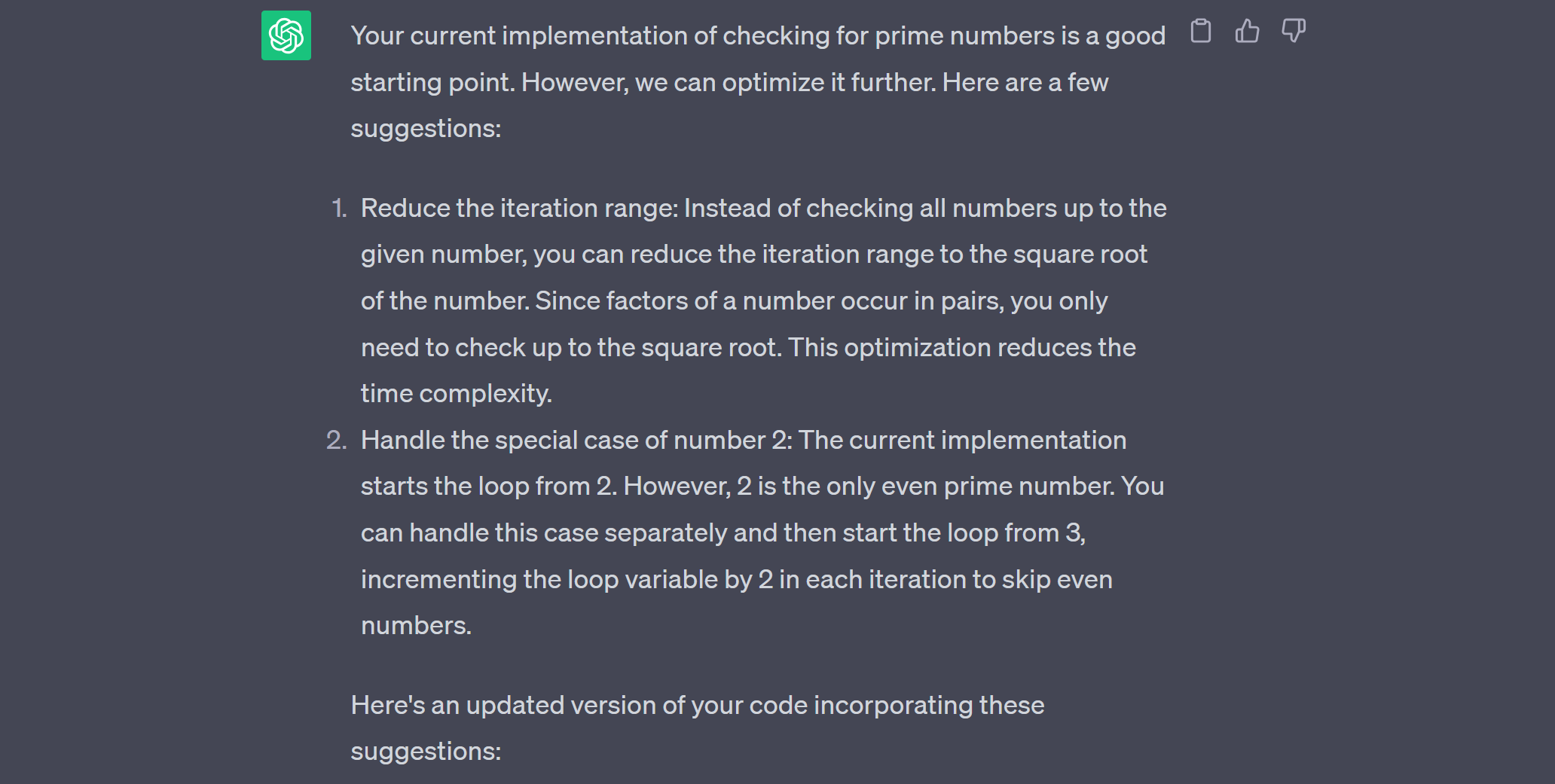 Source: Chat.openai.com
Source: Chat.openai.com
ChatGPT provided an updated version of the code incorporating the suggested optimizations.
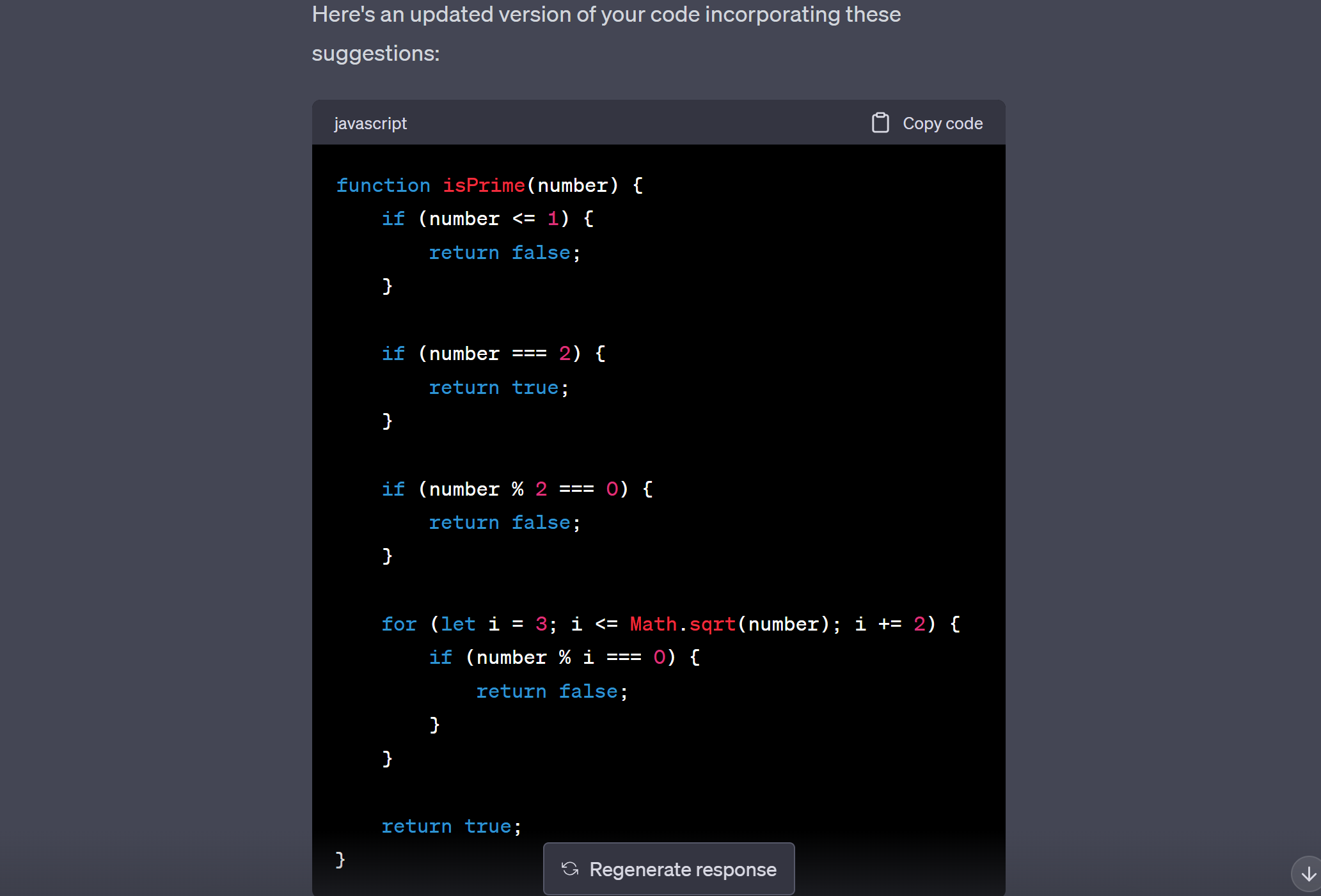 Source: Chat.openai.com
Source: Chat.openai.com
Implementing these suggestions makes the improved code more efficient by reducing unnecessary iterations and handling the special case of number 2 separately, resulting in faster prime number checks.
- Programming Education and Knowledge Expansion: Developers can utilize these models to enhance their programming skills and understanding. Developers can ask questions about specific programming concepts, algorithms, or language features by engaging in interactive conversations with the model.
For example:
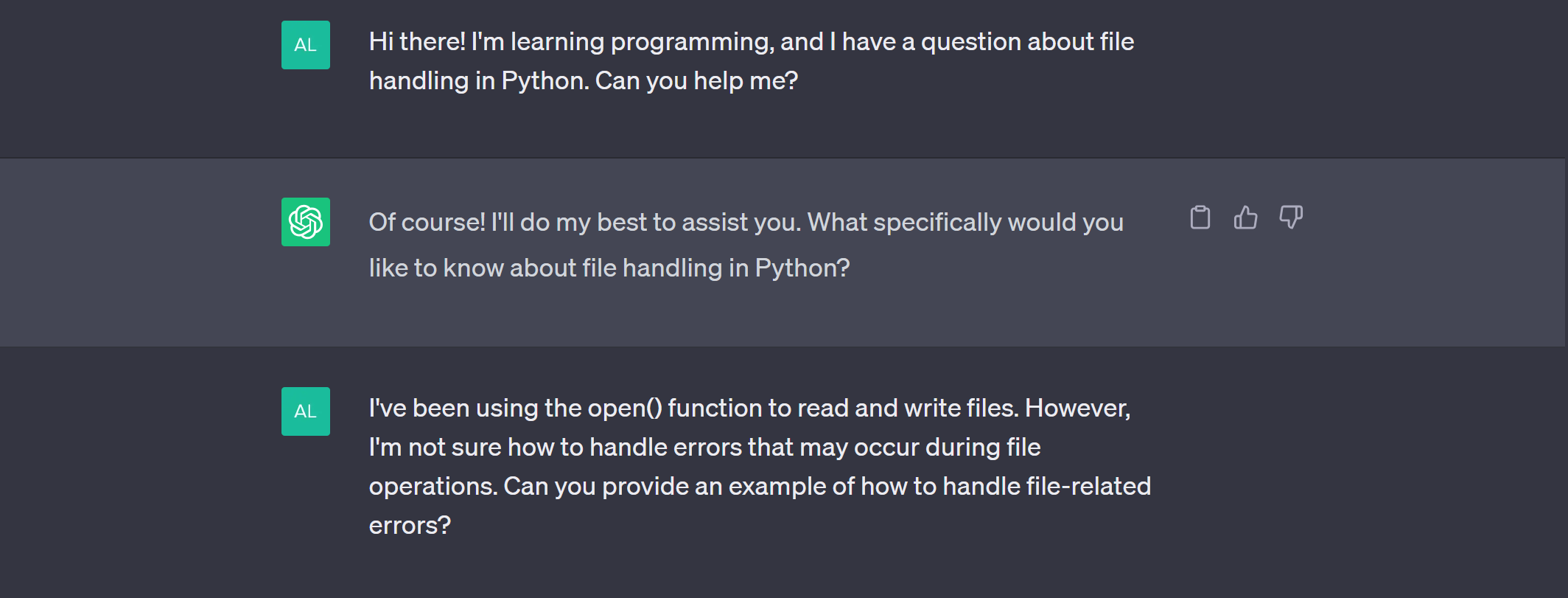 Source: Chat.openai.com
Source: Chat.openai.com
ChatGPT, with its vast knowledge base, can provide explanations, examples, and references to assist in learning. This interactive approach allows developers to receive guidance and clarification on various programming topics, promoting their professional growth.
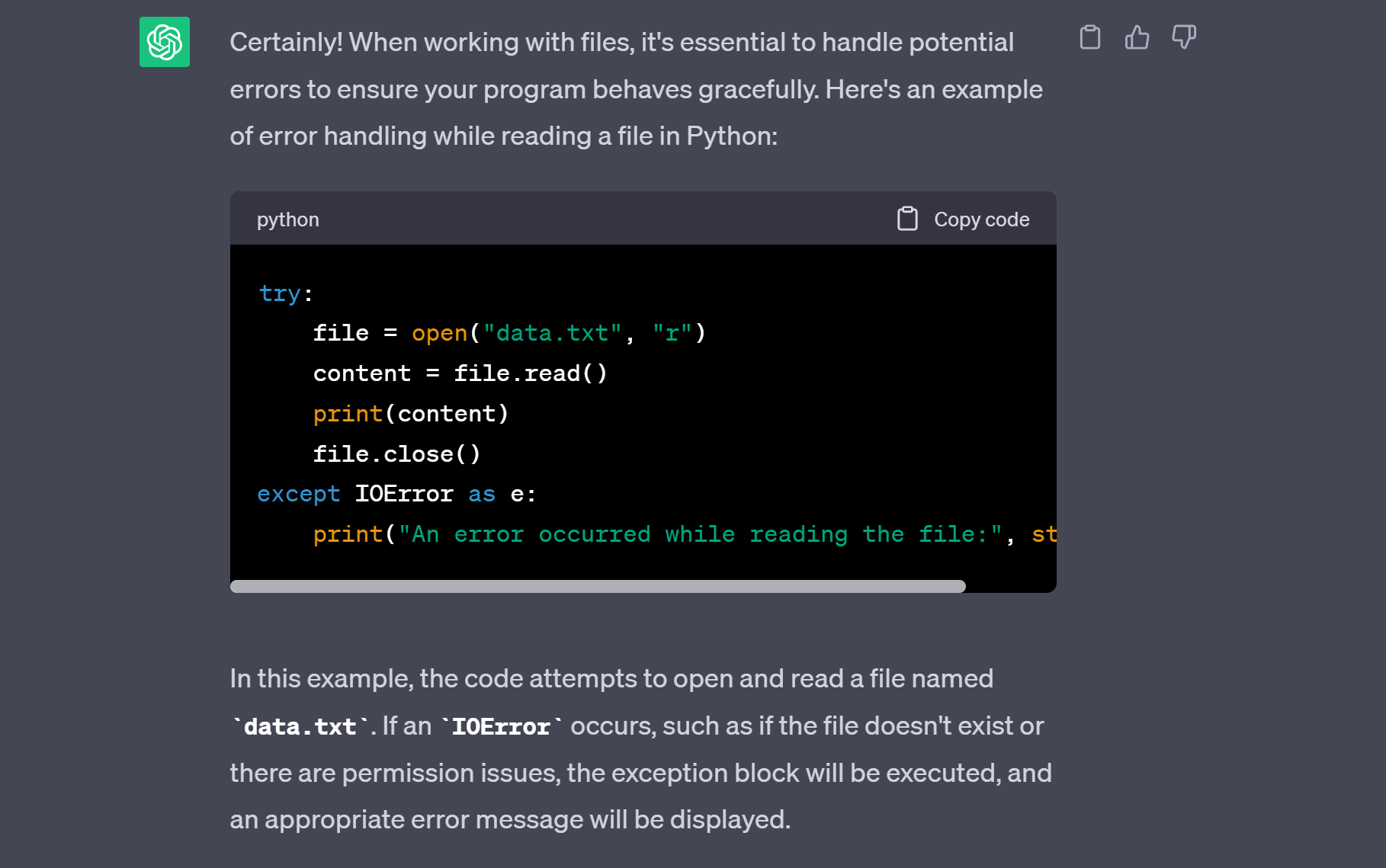 Source: Chat.openai.com
Source: Chat.openai.com
Whether it is understanding complex algorithms, grasping advanced language features, or exploring new programming paradigms, ChatGPT serves as a reliable and accessible source of information.
Developers can benefit from personalized and adaptive learning experiences by leveraging AI models for programming education. They can receive tailored explanations and insights based on their specific needs and skill levels. This capability empowers developers to expand their knowledge in a self-paced manner, making learning programming more engaging and efficient.
To witness the practical applications of AI models in software development, one can refer to research papers, industry publications, and official documentation from reputable sources like OpenAI. These sources provide real-world examples and case studies that showcase the effectiveness of AI models in improving productivity, code quality, and innovation.
Session Replay for Developers
Uncover frustrations, understand bugs and fix slowdowns like never before with OpenReplay — an open-source session replay tool for developers. Self-host it in minutes, and have complete control over your customer data. Check our GitHub repo and join the thousands of developers in our community.
The Potential Impact of ChatGPT on Software Developers
ChatGPT holds great potential to significantly impact software developers by providing numerous benefits and opening up new opportunities across various aspects of their work. It can potentially revolutionize how developers approach their tasks, particularly in debugging, testing, and enhancing productivity. However, evaluating both the advantages and limitations of integrating ChatGPT into software development workflows is crucial.
According to ScienceDirect, ChatGPT offers developers a powerful platform for expanding their knowledge and learning new concepts. Developers can ask questions about programming concepts, algorithms, or language features through interactive conversations, enabling self-guided learning. This dynamic learning experience allows developers to receive explanations, examples, and references, which can significantly contribute to their professional growth.
Moreover, ChatGPT can facilitate exploring and adopting new programming paradigms or languages. For instance, developers proficient in one language can leverage ChatGPT to seek guidance on unfamiliar languages or frameworks, accelerating their learning process and promoting versatility in their skill set.
ChatGPT as a Tool for Debugging and Testing
Regarding debugging and testing, ChatGPT can prove to be a valuable tool. Developers can engage in interactive conversations with the model, seeking explanations and insights to help identify and resolve issues more efficiently. Developers can leverage ChatGPT’s capabilities to gain valuable insights into their code by asking specific questions about code behavior or inquiring about alternative approaches.
Here are some examples of how ChatGPT can be utilized as a tool for debugging and testing code:
Error Message Analysis and Interpretation
Developers can provide ChatGPT with an error message they encounter and ask for insights into its potential causes. ChatGPT can analyze the error message and suggest possible reasons for the error. For instance:
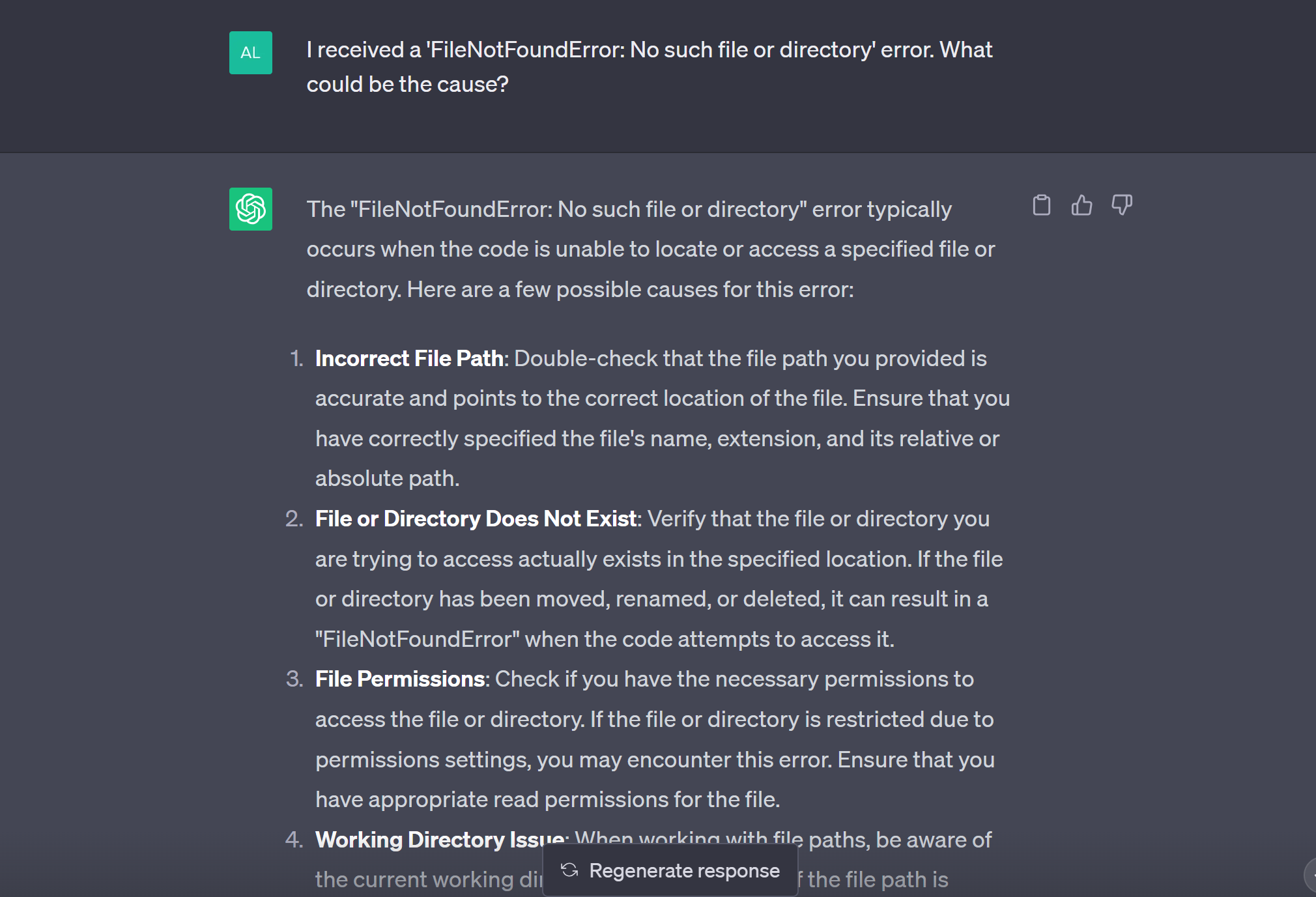 Source: Chat.openai.com
Source: Chat.openai.com
Code Behavior Investigation
When code does not produce the expected output or behaves unexpectedly, developers can seek assistance from ChatGPT to investigate the behavior. They can describe the code and its desired outcome, and ChatGPT can help identify potential issues.
For example:
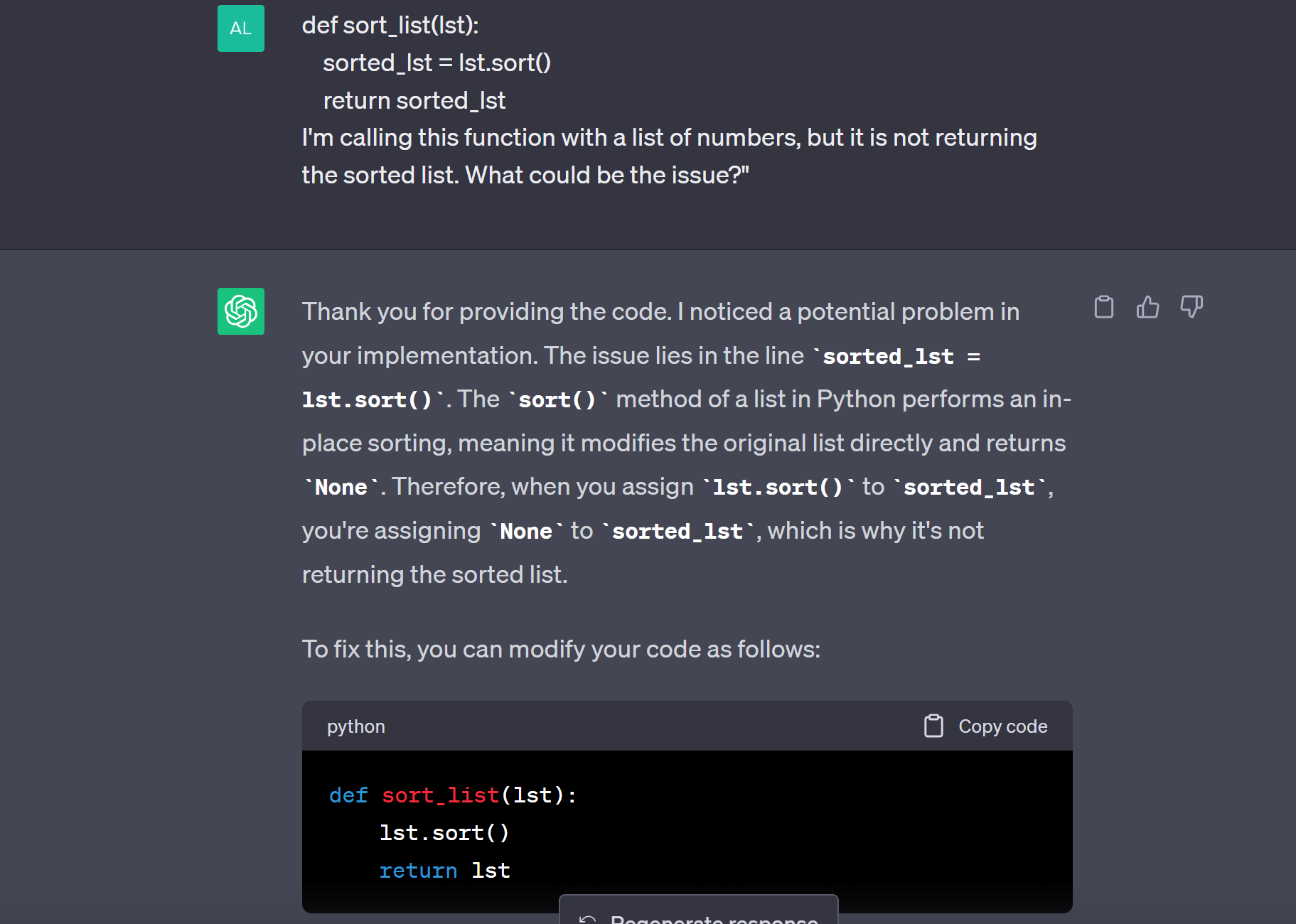 Source: Chat.openai.com
Source: Chat.openai.com
By describing the code and its desired outcome, developers can engage in interactive conversations with ChatGPT to analyze the code and receive insights on potential issues.
Algorithm Verification
Developers can discuss their algorithms with ChatGPT to validate their logic and reasoning.
For instance:
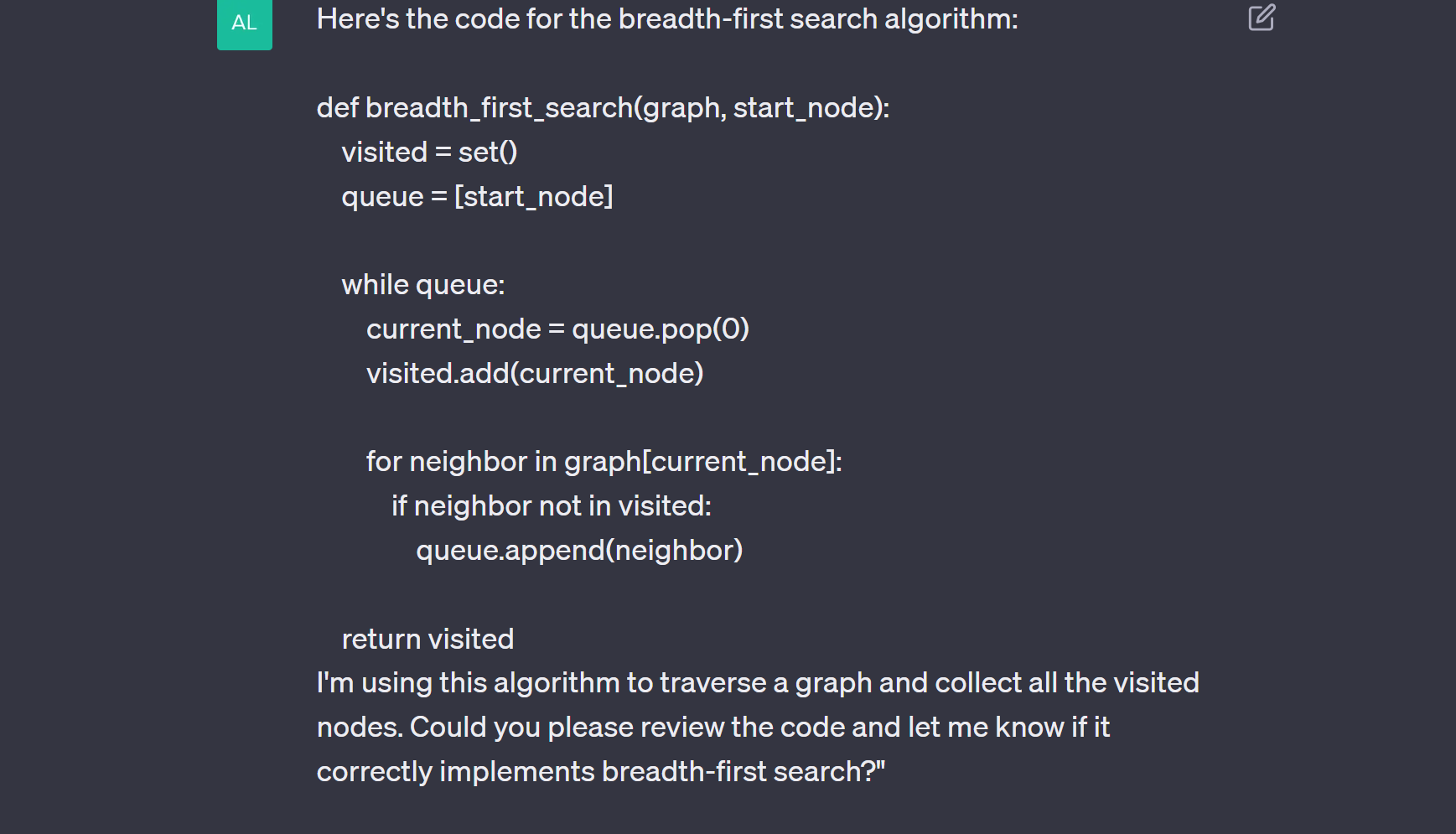 Source: Chat.openai.com
Source: Chat.openai.com
Developers can receive feedback and potential improvements by describing the algorithm and its expected behavior.
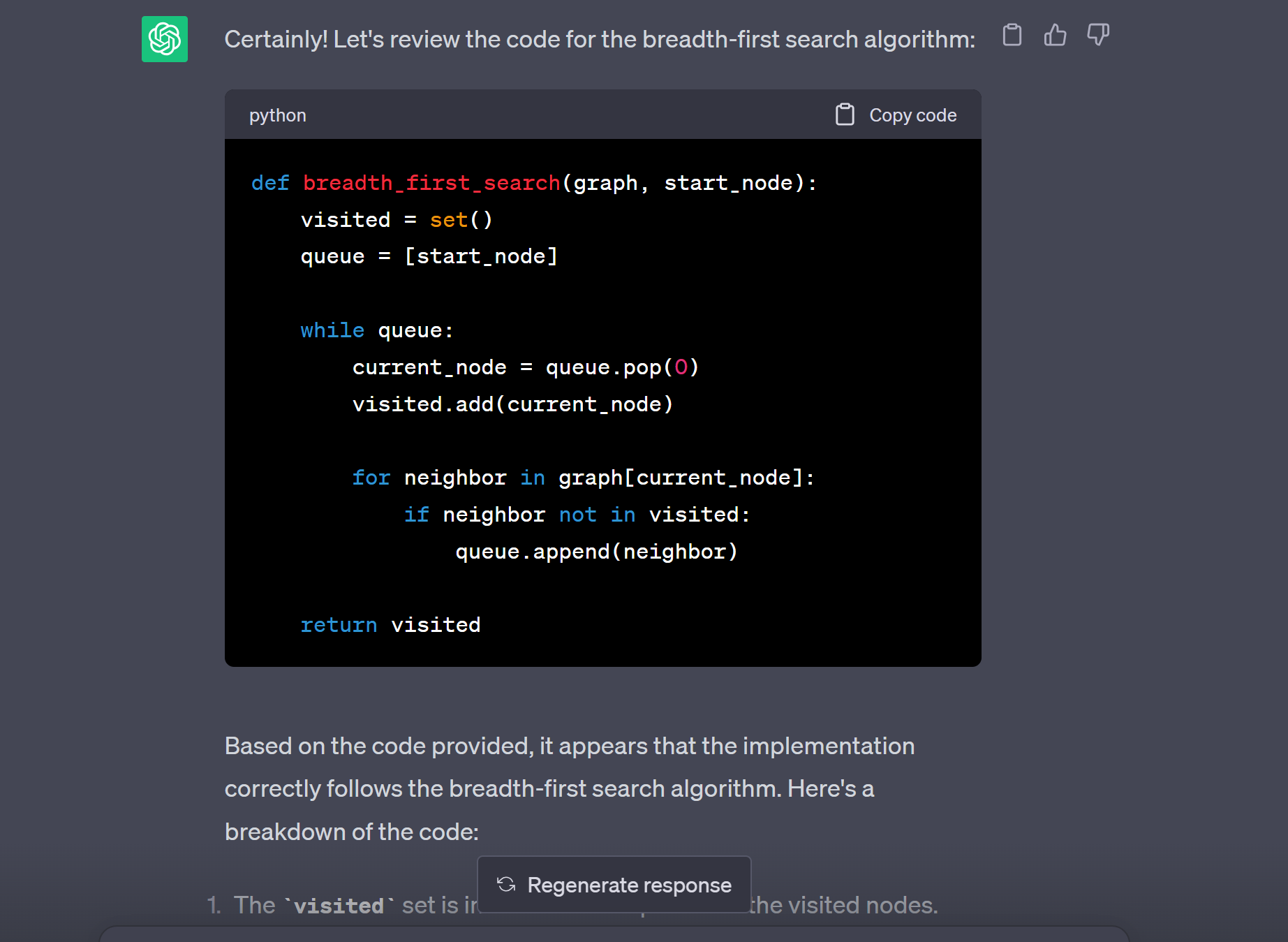 Source: Chat.openai.com
Source: Chat.openai.com
Test Case Suggestions
ChatGPT can assist developers in identifying relevant test cases, including edge cases, to ensure comprehensive testing coverage. Developers can describe their code or function, and ChatGPT can propose different input scenarios to test.
Here is a very basic example:
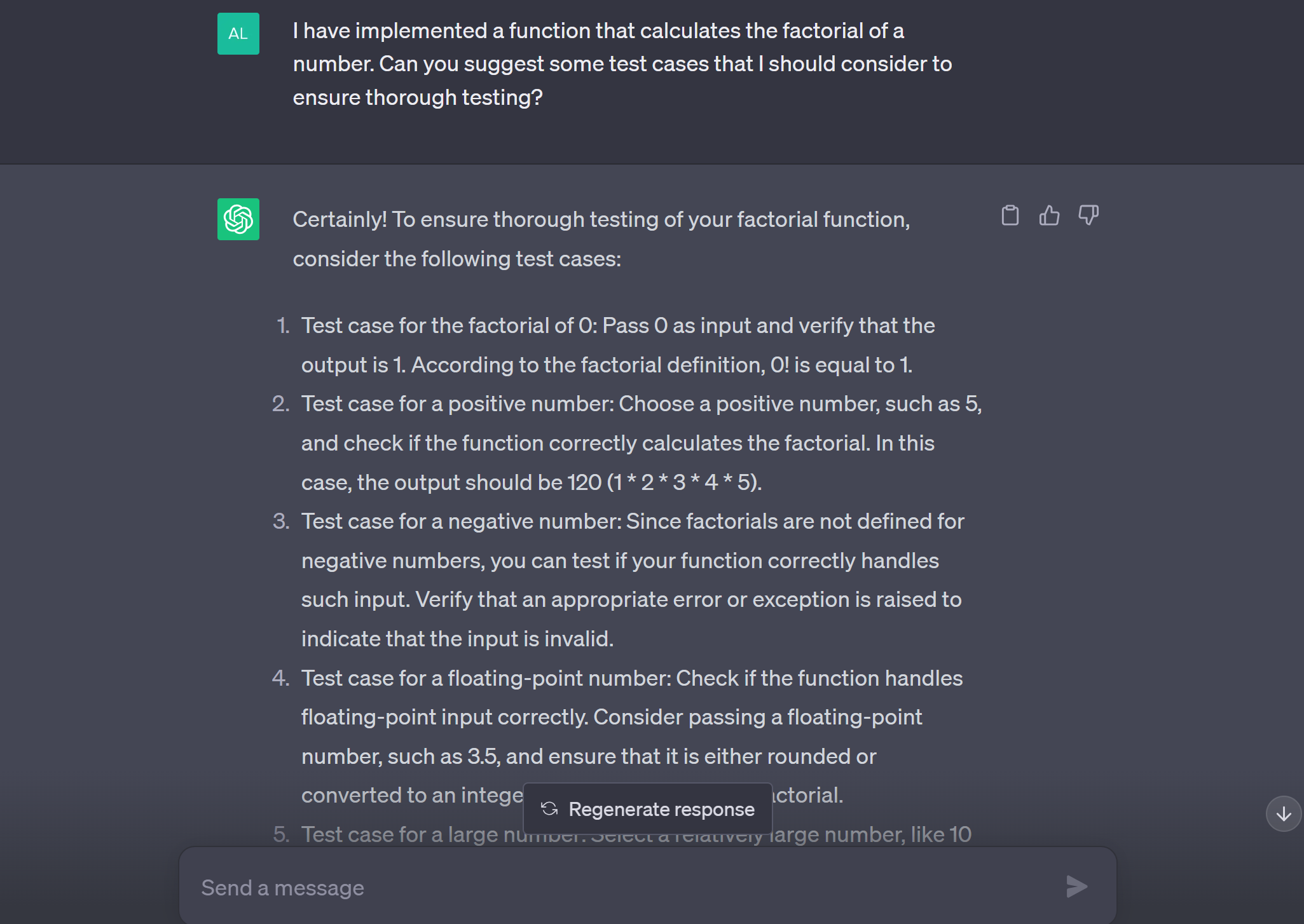 Source: Chat.openai.com
Source: Chat.openai.com
While ChatGPT can be a helpful tool for debugging and testing, it is important to remember that it does not replace traditional debugging practices or dedicated testing methodologies. Developers should use their expertise, manual testing, and other debugging tools in conjunction with ChatGPT’s assistance. It is essential to critically evaluate its suggestions before applying them to ensure they align with the specific codebase and requirements.
Opportunities for Software Developers
ChatGPT creates opportunities for software developers to expand their knowledge and learn new concepts. Developers can ask questions about specific programming concepts, algorithms, or language features through interactive conversations with the model, enabling self-guided learning. This interactive approach provides developers with explanations, examples, and references that contribute to their understanding and skill development.
ChatGPT can assist developers in exploring new programming paradigms or languages. For instance, a Python developer interested in learning JavaScript can engage in conversations with ChatGPT to ask about JavaScript syntax, best practices, or libraries. By leveraging ChatGPT’s capabilities, developers can accelerate their learning process and delve into new programming domains more effectively. ChatGPT also promotes collaboration within development teams. Developers can use the model to share knowledge, seek guidance, and exchange insights.
The integration of ChatGPT can also enhance collaboration within development teams. Developers can utilize the model as a shared resource, acquiring knowledge and insights from ChatGPT and subsequently sharing these learnings with their colleagues. This collaborative approach promotes continuous learning, fosters knowledge exchange, and contributes to a more cohesive and skilled development team.
It is essential to approach the suggestions by ChatGPT with a critical mindset. The model’s responses should be carefully evaluated, verified, and tested before being applied to production code. While ChatGPT can offer valuable suggestions, developers must exercise judgment and consider the broader implications and potential risks associated with the proposed changes.
What is the Future of Software Development with ChatGPT?
The future of software development with ChatGPT holds immense potential for transforming how developers work, collaborate, and innovate. As AI models continue to advance, ChatGPT is poised to play a significant role in shaping the future landscape of software development. Let’s explore what lies ahead and the potential implications of ChatGPT in the software development domain.
Potential benefits
- One of the critical aspects of the future of software development with ChatGPT is the augmentation of developer capabilities. ChatGPT can serve as a valuable tool in assisting developers throughout the development lifecycle, from ideation and problem-solving to code writing and debugging. Developers can access instant guidance, suggestions, and explanations for complex programming concepts, algorithms, and language features.
- ChatGPT’s ability to facilitate interactive conversations opens up new possibilities for self-guided learning and knowledge expansion. Developers can engage in dialogue with the model, asking questions and seeking clarification on various programming topics. This interactive approach allows developers to receive guidance and references, accelerating their professional growth and keeping up with the ever-evolving programming landscape.
- In terms of collaboration, ChatGPT promotes knowledge sharing and fosters a culture of continuous learning within development teams. Developers can leverage ChatGPT to share insights, discuss code, and seek solutions to challenges. By integrating ChatGPT into collaboration platforms, developers can access on-demand assistance, enabling efficient knowledge exchange and collaboration regardless of geographic location.
- The integration of ChatGPT in software development workflows has the potential to enhance productivity. Developers can rely on ChatGPT to quickly provide contextual assistance, reducing the time spent searching through documentation or online resources. This streamlines the development process and enables developers to focus more on actual coding and problem-solving.
Drawbacks
According to ScienceDirect, ChatGPT is not completely free from biases. Biases can be introduced during training due to the data used, the framing of prompts, or the model’s own limitations. These biases can manifest as skewed or inaccurate responses. Biases can include both explicit and implicit biases, and they can be influenced by factors such as cultural, societal, and historical contexts.
Some common biases include:
- Confirmation bias can lead the model to favor information that confirms preexisting beliefs or assumptions.
- Availability bias may cause the model to rely on easily accessible information, disregarding less remembered or less accessible details.
- False consensus bias can make the model assume its generated content is widely agreed upon, neglecting alternative perspectives.
- Hindsight bias, which can make the model overestimate its ability to accurately predict or explain past events.
The complete elimination of these biases will be challenging. This is because biases are deeply rooted in societal structures, and models trained on historical data may unintentionally perpetuate these biases. Addressing bias requires a multifaceted approach that involves technical solutions, interdisciplinary collaboration, and broader societal changes.
Successful Integration and Adoption of AI Models
To illustrate the successful integration and adoption of AI models like ChatGPT in real-world software development, numerous examples exist. Companies and research organizations have explored the integration of AI models for code generation, bug detection, and even automated refactoring. These applications showcase the potential of AI models to augment and assist developers in their day-to-day tasks, ultimately improving software quality and development efficiency.
A few examples include:
- Customer Support and Chatbots: Many companies have integrated AI language models into their customer support systems and chatbots. These models can understand and respond to customer queries, provide relevant information, and assist with common issues. Find some of the best chatbots examples here
- Content Generation: AI language models have been integrated into content generation systems, such as news articles, product descriptions, and marketing materials. These models can generate coherent and contextually relevant content based on prompts or specific guidelines.
- Virtual Assistants: AI language models have been used to develop virtual assistants that can understand and respond to voice commands or written queries. These assistants can set reminders, provide weather updates, answer general knowledge questions, and control smart home devices.
- Language Translation: AI language models have been integrated into language translation systems to improve accuracy and fluency. These models can understand the context of sentences and generate more accurate translations between different languages.
- Content Moderation: AI language models have been integrated into content moderation systems to identify and filter out inappropriate or harmful content. These models can analyze user-generated content, such as comments, posts, and messages, and flag potentially offensive or abusive content for human review. AI models help maintain a safer and more respectful online environment by automating content moderation.
Conclusion
The future of software development with AI models like ChatGPT holds great promise. The integration of these models has the potential to bring about a revolutionary transformation in the field. Software development encompasses a wide range of skills beyond mere coding. It necessitates problem-solving abilities, domain expertise, creativity, critical thinking, collaboration, and a deep understanding of user requirements. Language models like ChatGPT can be valuable to developers by offering suggestions, generating code snippets, or providing documentation. However, they fall short of comprehending the intricacies and complexities involved in software development. While AI can automate certain aspects of software development, it is improbable that it will completely replace software developers. Instead, a more likely scenario is that developers will collaborate with AI models, such as ChatGPT, leveraging their capabilities to enhance their work and foster innovation.
So, are we really looking at the end of the software developers as we know it with ChatGPT? I think not.
Additional Resources:

